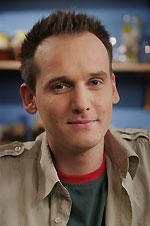Like his counterpart, Brodnicki is a household name with a hip image, and driven by a desire to break down barriers that put ordinary people off cooking.
It’s a small screen recipe that works: he draws four million viewers every Saturday for his regular show, and fans call him by his first name.
With his gelled hair and jeans, 30-year-old Brodnicki has an aversion to chef’s whites.
“I wanted to break down the stereotype of the chef with his hat, uniform and thermometer in his top pocket. People shouldn’t be overawed,” he said.
“I don’t do gastronomy. I do home cooking,” he added, before rustling up a quick mushroom and garlic sauce.
To give the show an authentic touch, Brodnicki doesn’t film in a studio but instead in a real kitchen in a house in suburban Warsaw.
Abroad, Polish food is often seen as nothing more than sausage, cabbage, beetroot and potatoes.
In reality, the nation’s cuisine belies the stodgy cliches, particularly since the end of the food shortages that marred people’s lives in the final years of communism. But it is still far from light on the stomach.
Like Jamie Oliver, one of Brodnicki’s underlying goals is to keep people off the fast-food track and prove that trying something different doesn’t have to be pretentious.
“These recipes might seem a bit basic for the French, but this is still something new for the Poles,” he said. “I want them to have a taste for cooking at home.”
“You shouldn’t forget that during communism, you could only get oranges and lemons during the holiday season.
More sophisticated ingredients such as aubergines or avocados have only been taken up in the past five years or so.”
Brodnicki says that he is also aware of his viewers’ financial constraints, noting that pensioners only get around 150-200 euros ($190-$260 ) a month.
While he might show them how to something pricey such as figs stuffed with liver and ham, he also gives them money-saving tips such as replacing mozzarella in another recipe with bundz, a local cheese.
His goal is to tickle the imagination of his viewers so that they eat better.
“One time an elderly lady came up to me and said: ‘Thanks for teaching me how to make spaghetti carbonara. Now my husband wants to have it twice a week,'” he said with a grin.
In front of the camera, Brodnicki shows that he isn’t just a media frontman, as he slices onions with professional dexterity.
He enthuses about his ingredients, dwelling on the beauty of a yellow pepper and singing the praises of basil.
As he darts around his kitchen, his hand gestures look almost Italian but his accent is 100 percent French – another selling point today, even though it gave producers initial jitters.
“At the beginning, the station had a few doubts because I spoke such lousy Polish,” he said.
As his surname suggests, Brodnicki indeed has Polish roots.
His father is from Poland, but his mother is French. He was born and brought up in Lille, in northeastern France, a region with a large Polish-origin community.
But as a child Brodnicki never spoke Polish.
He didn’t even visit Poland until he was 14, when his father came to the country to set up a business in the wake of the fall of communism in 1989.
Brodnicki learned the trade of chef on the job, moving from restaurant to restaurant in France.
“Every time I realised that I wasn’t learning anything new, I quit,” he said.
He became a television star by accident. A Polish production company was looking to imitate Jamie Oliver’s BBC show.
They discovered Brodnicki in a private training college in Poland, where he was giving cooking lessons.
“Why did they pick me? They needed someone with a cool image, plus I had an exotic accent – and I’m not such a bad chef,” he said, smiling.
Brodnicki is often stopped by fans in Poland. But when he heads back to France, he is just another man in the street.
He says he has no plans to return home for good, repeating the common refrain of many French expatriates who see their country as stuck in the past, and a place where individual initiative gets mired in bureaucracy.
“Poland is a free country, even if things are very tough for people. Here I’ve been able to get on by myself, earn my living better, and have a better life,” he said.
Image: Poland, Warsaw: French cook from Polish origins, Pascal Brodnicki, 30, is pictured in his kitchen during the recording of his TV show in Warsaw, 14 November 2006. AFP / Wojtek Radwanski

